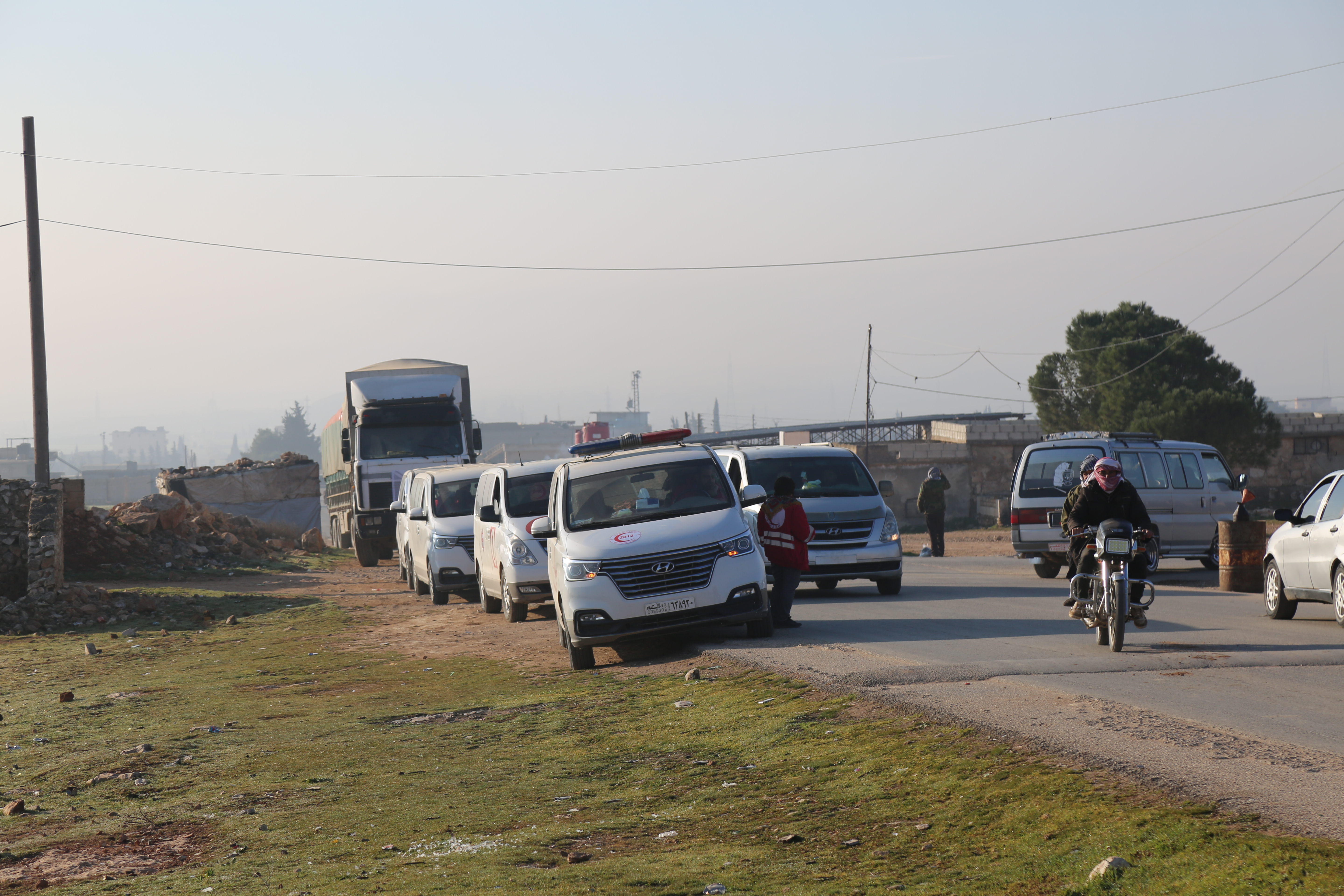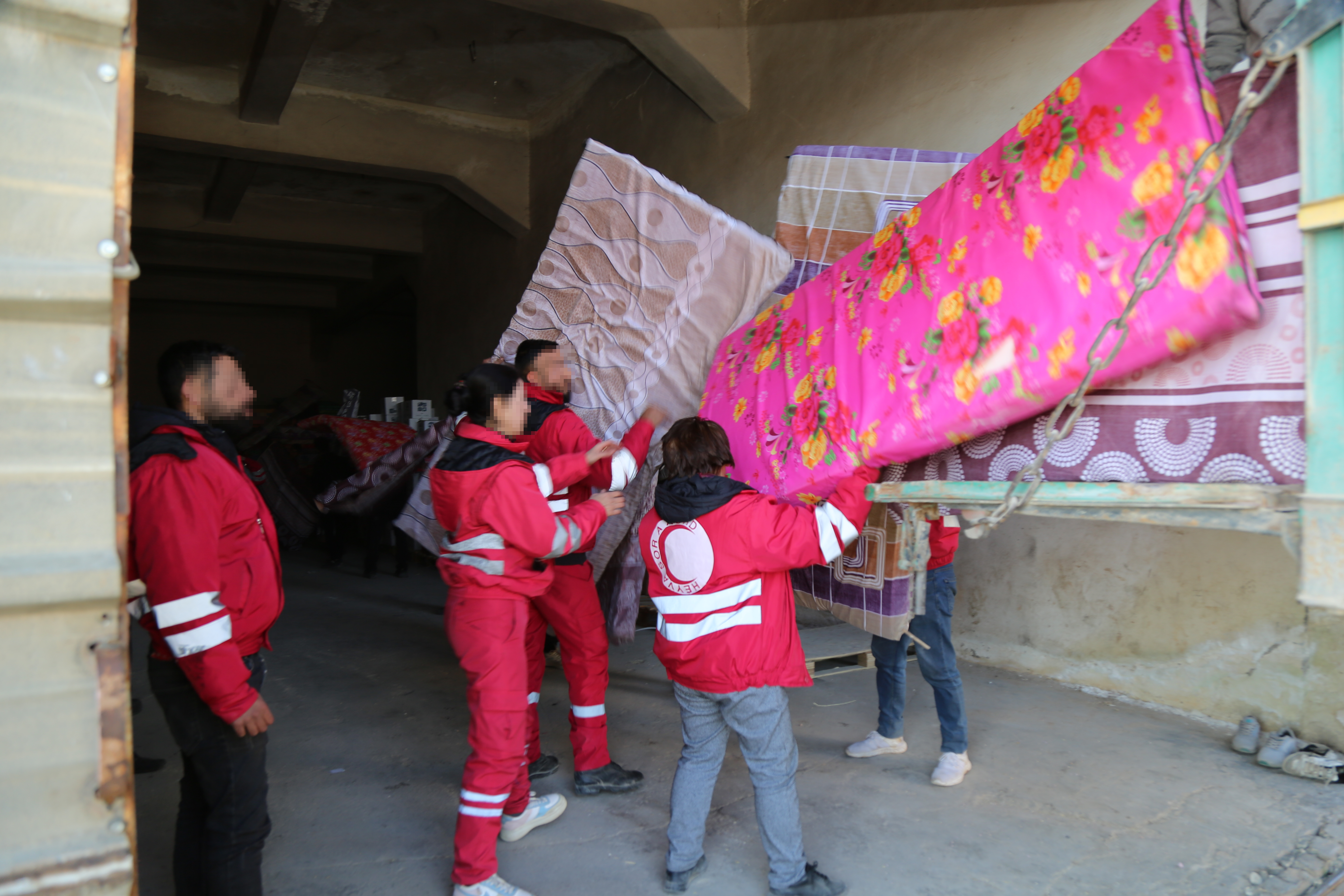
earthquake-response-in-syria-stand-your-ground-feature-230211-krc-convoy-waiting-at-che-fca44ebc
Earthquake emergency aid in Syria: Hang in there!
The Kurdish Red Crescent provides life-saving aid – and is repeatedly hindered in doing so.
On Tuesday, February 21, 2023, the Kurdish Red Crescent (KRC) aid convoy, also known as Heyva Sor A Kurd, was finally able to pass through the Syrian regime checkpoint and deliver its humanitarian supplies to their destination in Aleppo. For a week and a half, KRC aid workers were stuck there in the freezing cold with their ambulances and fully loaded trucks, while people fifty kilometers away waited to be rescued after the earthquake on February 6. The reason for the blockade: KRC should either hand over a large part of its goods and ambulances directly to the Syrian regime or hand them over to the Syrian Arab Red Crescent (SARC), which cooperates with it. However, as experience has shown that the redirection of relief supplies is commonplace and there is then no longer any proof of where they are delivered and how they are used, this was out of the question.
KRC persevered: after tough negotiations and with international support, the entire convoy was finally able to continue its journey. The NFIs (non-food items such as mattresses, blankets, winter clothing, tents and diesel for heating) that arrived in Aleppo, as well as medicines and bandages for emergency care, were distributed from there. The districts of Sheikh Maqsood and Ashrafia, which have already been badly affected by the war, are particularly in need of support. Some of the relief supplies were transported in one of the ambulances to the Shahbah region, where a KRC team was already working before the earthquake.
 After intensive negotiations, the KRC convoy can continue its journey on February 21. Photo: Ahmed Ibrahim – KRC Communications Officer/ Photographer
After intensive negotiations, the KRC convoy can continue its journey on February 21. Photo: Ahmed Ibrahim – KRC Communications Officer/ Photographer
The Shahbah camps with up to 20,000 people who fled the war in Afrin grew by thousands more after the earthquake. The supply situation was already critical beforehand. This is because the area is encircled between the Syrian regime and the Turkish occupation, and both parties hardly allow any help there. KRC is now primarily concerned with providing for the new refugees from Aleppo and expanding the infrastructure of the camps. There are plans to massively expand the teams on site with medical staff, experts in the field of WASH (water, sanitation and hygiene) and engineers. Transporting aid from outside continues to be more than difficult; the organization buys everything it needs locally. Donations are currently the best way to support the essential work of KRC.
This is exactly where CADUS comes in with its donation campaign for earthquake emergency aid. As we are an international NGO registered with the AANES (Autonomous Administration of North and East Syria), we can only work in the north-east of Syria and have no access to the areas controlled by the Syrian regime or the Turkish regime. An attempt by CADUS to reach the regions most affected by the earthquake would be considered a criminal act by these regimes. On the way there, we would also be exposed to the acute danger of Turkish air strikes and drone attacks, as well as battles in the civil war that has been raging for almost 13 years and the threat from various armed groups. Although areas controlled by AANES and SDF (Syrian Democratic Forces) further to the west are also severely affected by the earthquake, the route there leads through areas of the regime that are impassable for us. Unlike CADUS, the Kurdish Red Crescent already has teams on the ground there.
 The urgently needed relief supplies are unloaded in Aleppo. Photo: Ahmed Ibrahim – KRC Communications Officer/ Photographer
The urgently needed relief supplies are unloaded in Aleppo. Photo: Ahmed Ibrahim – KRC Communications Officer/ Photographer
On the day of the earthquake, KRC aid workers were therefore able to help immediately in some of the worst-affected places. In addition to emergency medical aid, they provided heated tents as emergency accommodation, blankets and warm drinks. It is also essential to raise awareness of what to do in the event of an earthquake. Many injuries were caused by panic reactions. As the region is repeatedly shaken by strong aftershocks, the need for relevant information could hardly be more urgent. KRC is also addressing the psychosocial effects of the earthquake. The disaster has hit a country whose population has been suffering one serious blow after another for years. In the last few months alone, the attacks by Turkey have been compounded by attacks by the so-called Islamic State (IS), a cholera and flu epidemic, blatant water and electricity shortages, a steady economic downturn and runaway inflation.
As an organization that has been working in north-east Syria for years, we ask ourselves how the people there manage to keep starting from scratch and rebuilding structures. The history of KRC is an impressive example: the rescue organization was founded in 2012 in response to the conflicts in the region. Only two years older than CADUS, KRC has developed from an association of volunteers into a regionally wide-ranging, independent and professional aid organization that strictly adheres to humanitarian principles and is committed to the Code of Conduct of the International Federation of Red Cross and Red Crescent Societies. KRC currently operates 44 primary health care clinics, 64 outpatient clinics and is active in the WASH sector. The organization is quickly ready to provide acute emergency aid as well as long-term care for people in the many camps.
KRC provides regular updates on its latest activities on Facebook
Published:
Author: by Corinna Schäfer
By CadusPR
Stay informed about our missions, events and humanitarian emergency aid topics – with our newsletter!
Newsletter registration
I want to unsubscribe from the newsletter.



